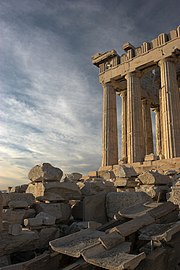5th century BC c.
Contenido keyboard_arrow_down
The 5th century B.C. C. or century V a. and. c. (5th century BC) began on January 1, 500 BC. C. and ended on December 31, 401 BC. C. In the West it is called the "Century of Pericles".
Relevant events
Wars and Politics
- Iberian Peninsula: End of the kingdom of Tartessos. From 475 B.C. to 250 B.C., apogee of the Turdean culture.
- Roman Republic: Marco Furio Camilo — as part of his reform of the legion and in war with the Etruscan city of Veyes — establishes the stipendium (soldada). In 450 BC, Law of the XII Tables.
- Medical wars in which the Greeks defeated the Persians twice (490 and 480 B.C.) in battles such as the Marathon, Las Termópilas, Salamina or Platea. Thebes, ally of the Persian invaders, was subject to serious sanctions. Sea power of Athens; Pericles government. At the end of the century the Peloponnesian War broke out, between Sparta and Athens, which ended with the victory of the first of them.
- The commercial and territorial expansion of Cartago, which controls the Western Mediterranean, continues in North Africa. In Italy it frequently clashes with Etruria and the Greek colonies.
- Egypt is subdued by the death of Darius II, ending the first Persian occupation—Dinastía XXVII (400-398 BC) and Dinastía XXVIII of Egypt—.
- In China it still governs the Zhou Dynasty but begins the period of combatants (475-221 BC).
- In India, the Magadha kingdom expands under the Nanda dynasty empire.
- On the Arabian peninsula, the kingdom of Saba remains the most developed and powerful, controlling the Incense Route but rivals arise: Ma'in, Qataban and Hadhramaut.
- The indochinese peninsula is coming out of the age of bronze. In the north of Vietnam the Dong Son culture flourishes even in the tradition of bronze, while in the south the inhabitants of the Austronian-speaking natives of Borneo are settled. Links to Austronesia are constant. The Mon-Khmer village is located in Cambodia.
- The village of Monte Albán is founded in the Central Valleys of Oaxaca.
- In Mexico, the Olmeca culture ends (1200-400 BC). It approaches the end of the so-called Mesoamerican preclassic period (from 1500 to C. to 300 AD).
- In Peru (South America) the culture paracas (700-200 B.C.) sees the beginning of its stage "necropolis paracas", while in the north the Chavín culture (1200-200 B.C.) enters the final stage of its apogee.
Culture
- Ezra, Hebrew scribe who participated in the return of Jewish exile in Babylon, compiles the books of the Old Testament and thus closes the Hebrew canon. This concludes with some statements by Josefo. This canon did not include the apocryphal books.
- Malachi, prophet of the Old Testament, writes the book that bears his name and is considered the last written book of the Hebrew canon.
- At the beginning of the century the Temple of Afea is erected in Egina.
- The Greeks Aristophanes (444-380 BC), Sophocles and Euripides develop their work.
- Philosophy: Democrit (460-370 BC), and Empédocles.
- The Lady of Elche, a limestone Iberian bust, dates back to the 5th to 4th centuries. C.
- Poseidon Temple in Paestum (460 BC).
- The Parthenon in Athens (447-432 BC). The Erecteion.
- They perform their works the sculptors of classical Greece: Mirón, Fidias and Policleto.
Relevant characters
- Alcibías, prominent statesman, speaker and general ateniense (h. 450-404 a.C.).
- Aristides “the Righteous” (f. 467 B.C.), archer and strategist, during the Medical Wars.
- Aristophanes, Greek playwright (444-385 BC).
- Buddha, Hindu religious (approx. 560-480 BC).
- Cimon of Athens, stratigo and statesman (510-450 BC).
- Confucius, Chinese thinker 551-479 a. C.
- Democrit, Greek philosopher (h. 460-370 BC).
- Ezra (457-408 BC), a period of 49 years to restore and build Jerusalem, Ezra leads the Jewish people from exile by Decree of Artaxerxes I.
- Spill, Greek playwright (525-456).
- Euribíades, Navarca who led along with Temístocles the Greek fleet in the battle of Salamina.
- Eurípides, Greek playwright (480-406 BC).
- Herodote, historian and Greek geographer (484-425 BC).
- Hipías (f. 490 B.C.), son of Pisstrate.
- Hippocrates, called "father of medicine" (sixteenth century)V- centuryIVa. C.).
- Leonidas I, king of Sparta, hero of the battle of the Thermopilas (f. 480 B.C.).
- Leotish II, king of Sparta, who, in command of the Greek fleet, beat the Persians in the battle of Mica (ruled from 491 BC to 469 BC).
- Lisandro (f. 395 B.C.), commander of the Spartan fleet who beat the Athenians in the decisive battle of Egospótamos.
- Majavirá, founder of the Yainist religion (549 BC-477 BC).
- Milcíades el Joven, stratego, hero of the Battle of Marathon (h. 550-488 B.C.).
- Miron, Greek sculptor (worked h. 480-440 B.C.).
- Nehemiah, a biblical character, considered the author of the book bearing his name.
- Nicias, general and statesman of ancient Athens (470-413 BC).
- Pānini, Indian grammar (c. 520-460 BC).
- Pausanias, king of Sparta, supreme commander of the Greek army in the battle of Platea.
- Pericles, Greek politician (495-429).
- Píndaro, Greek poet (518-438 BC).
- Plato, Greek philosopher (h. 427-347 BC).
- Polyclete, Greek sculptor (centuryV and early centuriesIVa. C.).
- Socrates, Greek philosopher (470-399 BC).
- Sophocles, Greek playwright (496-406 BC).
- Tucidides, historian and Athenian military (h. 460-396 B.C.).
- Zenon of Elea, eleata philosopher (h. 490-430 B.C.).
Contenido relacionado
Navamorales
Mozárbez
538
Más resultados...




